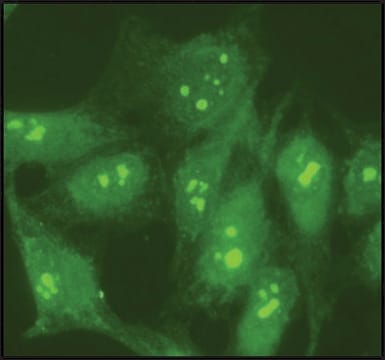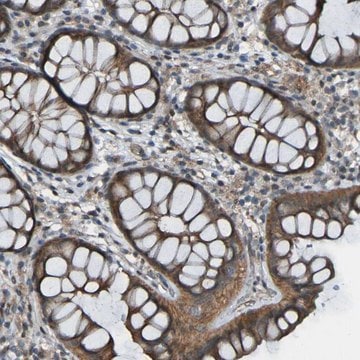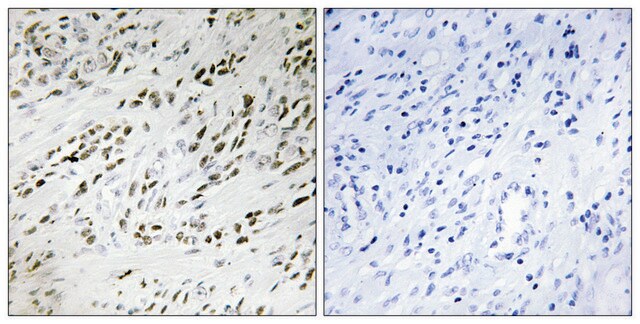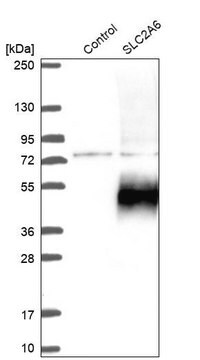MAB1277-I
Anti-Nucleoli Antibody, clone 125-10
About This Item
Prodotti consigliati
Origine biologica
mouse
Livello qualitativo
Coniugato
unconjugated
Forma dell’anticorpo
purified antibody
Tipo di anticorpo
primary antibodies, primary antibodies
Clone
125-10, monoclonal
Purificato mediante
using protein G
Reattività contro le specie
human
Confezionamento
antibody small pack of 100 μg
tecniche
immunocytochemistry: suitable
immunofluorescence: suitable
Isotipo
IgG1κ
Sequenza dell’epitopo
Unknown
Condizioni di spedizione
dry ice
modifica post-traduzionali bersaglio
unmodified
Descrizione generale
Specificità
Immunogeno
Applicazioni
Evaluated by Immunocytochemistry in A431 cells.
Immunocytochemistry Analysis: A 1:1,000 dilution of this antibody detected Nucleoli in A431 cells.
Tested Applications
Immunocytochemistry Analysis: A representative lot detected Nucleoli in Immunocytochemistry applications (Endo, A., et al. (2009). J Biol Chem. 284(41):27918-27923; Endo, A., et al. (2009). J Cell Sci. 122(Pt 5):678-86).
Immunofluorescence Analysis: A representative lot detected Nucleoli in Immunofluorescence applications (Clements, D., et al. (2007). Am J Physiol Lung Cell Mol Physiol. 292(1):L258-66; Vallee, D., et al. (2004). J Med Genet. 41(10):778-83; Ohno, M., et al. (2002). Chromosoma. 111(3):201-13).
Note: Actual optimal working dilutions must be determined by end user as specimens, and experimental conditions may vary with the end user
Stato fisico
Stoccaggio e stabilità
Altre note
Esclusione di responsabilità
Codice della classe di stoccaggio
12 - Non Combustible Liquids
Classe di pericolosità dell'acqua (WGK)
WGK 2
Punto d’infiammabilità (°F)
Not applicable
Punto d’infiammabilità (°C)
Not applicable
Certificati d'analisi (COA)
Cerca il Certificati d'analisi (COA) digitando il numero di lotto/batch corrispondente. I numeri di lotto o di batch sono stampati sull'etichetta dei prodotti dopo la parola ‘Lotto’ o ‘Batch’.
Possiedi già questo prodotto?
I documenti relativi ai prodotti acquistati recentemente sono disponibili nell’Archivio dei documenti.
Il team dei nostri ricercatori vanta grande esperienza in tutte le aree della ricerca quali Life Science, scienza dei materiali, sintesi chimica, cromatografia, discipline analitiche, ecc..
Contatta l'Assistenza Tecnica.







